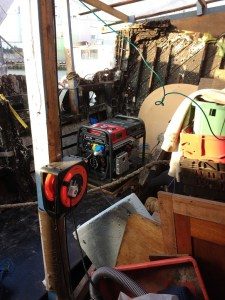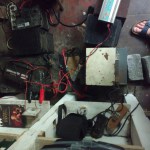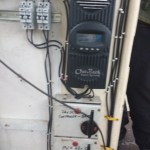Since first writing this report the Minesweeper has been destroyed by a terrible fire on 5th Jan 11pm. Despite quick response from the London Fire Service and attendance of a dozen fire engines, it was all over by 5am – toast. Adjacent boats were also effected as was the mechanics workshop in the Brookmash estate. YT visited on Friday and stood on the river wall there with some Minesweeper Collective members looking over the side into the abyss of charred timbers and blackened soup of belongings, chairs, books, some vinyl records and somewhat strangely, bags of charcoal untouched by the fire.
For those living and working aboard the Minesweeper, keeping warm during winter months presents the greatest hardship. Wood burners are kept alight 24/7 that require continual feeding. A store of suitable timber has to be collected throughout autumn and kept dry for use. Neighbours in in Brookmash yard supply the off-cuts from their furniture production. (as well as supply power the broadband wireless uplink)
 The collective recently purchased a new AC generator after many months fundraising and having experienced breakdown of previous secondhand units, however bad luck has again struck, an oil leak forces it’s return for repair, leaving them without power again. A new wind turbine is ready for installation, to provide the top up charge their battery array needs if it to remain in good condition to supply 12v for lighting and laptop
The collective recently purchased a new AC generator after many months fundraising and having experienced breakdown of previous secondhand units, however bad luck has again struck, an oil leak forces it’s return for repair, leaving them without power again. A new wind turbine is ready for installation, to provide the top up charge their battery array needs if it to remain in good condition to supply 12v for lighting and laptop  charging. The print working areas of the minesweeper already have bright LED worklights fitted, with more needed throughout, as well as external motion triggered perimeter and safety lighting.
charging. The print working areas of the minesweeper already have bright LED worklights fitted, with more needed throughout, as well as external motion triggered perimeter and safety lighting.
 An energy audit was carried out on the boat late summer as part of the Creeknet pilot, which revealed just how much energy the print curing and screen cleaning processes demand, too much of a shortfall for any solar or wind turbine system to close. Gaining a better understanding about how off-grid power systems need to be configured and managed has been difficult, though progress is being made. We recently visited other boats on the creek and noted how their installed systems reliably store and distribute available power as needed, so will return for their support if the need arises.
An energy audit was carried out on the boat late summer as part of the Creeknet pilot, which revealed just how much energy the print curing and screen cleaning processes demand, too much of a shortfall for any solar or wind turbine system to close. Gaining a better understanding about how off-grid power systems need to be configured and managed has been difficult, though progress is being made. We recently visited other boats on the creek and noted how their installed systems reliably store and distribute available power as needed, so will return for their support if the need arises.
Over a year ago, YT attended Transmediale media arts festival in Berlin to meet up with old friends living in the city and introduce them to members of the Mazi project attending for the first time. One of the first panels Global Ports still resonates as we edge forward with Creeknet pilot in Deptford. Much like in Port of Hamburg, the PLA (Port of London Authority) conforms a hydrachy of power, governing access to the waterways of the city, monitoring shipping and controlling all but the the weather and tides.
For those who are dependent on the Thames and it’s tributaries for transport, trade and residence, there are very few resources available to guide use and track changing conditions. It’s the knowledge of the boating community and their interpretation of PLA bylaws that hold sway here. Resistance, skulks the waters edge, using forgotten inlets, overgrown steps and derelict locks, to retain river access and uphold liberties. Mooring rights and tidal rituals, ebb and flow along the river wall, entangled in mooring chains, revealed as the river bed is drained by tides.
The Thames river wall all the way into Deptford Creek is part of the UK coastline, it’s beaches are monitored and rubbish cleared. Material on the shore clusters much where it was dropped into the water so great collections of red brick, clay pipes, animal bones, oyster shells and drift wood colour the shorelines in alignment to forgotten industry. Warehouses and wharves are fast being replaced by multi-story condos, only a very few remain out of the grasp of developers such as the abandoned squatted restaurant on Odessa Street up river in Rotherhithe, where recent Minesweeper fundraiser was such a success.
The burning of the Minsweeper and subsequent loss of mooring access at Brookmarsh Yard in Greenwich, point to an inevitability that will end occupation of these reaches by the many barges and boats currently resident. Lengthy negotiations and legal actions by boaters to retain land access and not often ended well. Current proposals for redevelopment at 2 Creekside could well be followed by overturning of long established moorings at No4. Meanwhile, redevelopment of No3 and No1 form breaking wave of transformation that may well consume all undeveloped land and property up to Deptford Church Street.
